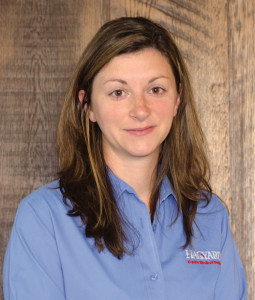Horse Show 911
Click here to read the complete article
Handling Health Emergencies Away From Home
By Megan Arszman
The All-American Quarter Horse Congress has arrived, and you’ve been working for that trot down the center of the Celeste all summer long. Like every Congress, the weather was blissfully warm and sunny yesterday, but now it’s frigid and rainy. You get your horse out of the stall and you notice something’s not right. His head is low, stomach is drawn in, and he’s unwilling to move. Your horse is colicking.
Call it bad timing, but things like this happen all the time while on the road. Although autumn doesn’t have the hot and humid days of summer or the frigid cold of winter, the constant change in weather conditions can send your horse’s immune system into a tailspin.
By taking the time to arm yourself with knowledge and the right resources, you can head into the end of the show season with a healthy horse that’s ready for anything.
 Preparation is the Best Defense
Preparation is the Best Defense
Before you even hit the road bound for the big show, you need to be prepared for what might happen along the way. Pete Kazakevicius, DVM, recommends that horse owners take the time to discuss their horse’s health with their veterinarian before getting on the road.
“The biggest thing, to me, is knowing your horse and how he acts, having a good wellness program, and having a good relationship with your trainer and veterinarian,” says Dr. Kazakevicius. “Take the time to get your horse ready to go to the shows, so he’s in good shape, both soundness- and body-wise.”
This Ocala-based veterinarian is familiar with the stress that large shows like the Congress and World show can put on a horse, after spending many years on the road with his daughter and now amateur competitor, Rebekah Kazakevicius.
“I’ve always preached [to Rebekah] about preventative medicine—consistent monitoring of her horse and treating preventatively before it becomes a problem. She’s always done that and has been lucky to prevent any major problems before they occur,” he says.
Kazakevicius has three points owners should be aware of when traveling:
Be proactive: Know your horse and his attitude. If something seems off and he’s not his usual self, something’s wrong.
Be diligent: Check on how your horse is doing throughout the day—monitor his water intake, watch how he’s eating, and how he’s feeling.
Be prepared: Prior to leaving for a show, check to see who the official show veterinarians and farriers are.
Keeping tabs on the latest information about disease outbreaks is also very important. If you’re traveling to an area that might be having a high case of diseases such as Potomac Horse Fever, Eastern Equine Encephalitis, West Nile Virus, or strangles, you’ll want to get your horse vaccinated against those diseases prior to shipping.
Other routine vaccines to include are equine influenza (which is now being pushed for every six months), equine herpesvirus, and rhinovirus.
“The timing [of vaccines] is important,” points out Kazakevicius. “Don’t do them right before you go to a show, because sometimes horses can have reactions to the vaccination. You want the horse to be able to build up enough immunity, and that usually takes about two weeks. Vaccinate maybe 30 days beforehand, or at least know that they’ve been vaccinated and keep the vaccines up to date,” he says.
Liz Barrett, DVM, with Hagyard Equine Medical Institute, recommends that her clients research the regional area where they’re planning to travel. She normally recommends vaccinating for equine herpesvirus types 1-4, influenza, tetanus, and rabies.
Another concern is how your horse deals with the stress of the big competition and the long haul to the show. To deal with ulcers, Dr. Kazakevicius believes prevention is the best medicine.
“We always put our horses on some sort of gastro-protectant, whether it’s GastroGard® or UlcerGard®. We’ll start it the day before they leave to go to the show and continue until the last day, or when they get home,” he explains. “Some people will oil their horses, or feed a mash with oil, and make sure they get plenty of water.”
Diligence While Traveling
While on the road, keep an eye on your horse’s hydration. Even though the temperature has cooled down and your horse might not be sweating as much as he was in the summer, he still needs sufficient water intake to avoid impaction and other forms of colic.
On long trips, taking frequent breaks to allow your horse to stretch his legs and relax from constantly supporting his body weight in the trailer will help him arrive more rested, which means he’ll stay healthier, too.
Coping with Colic
Colic is one of those health concerns that can be a mystery to horse owners. Both Barrett and Kazakevicius urge horse owners to act quickly.
“The sooner you get to treatment, the sooner they’ll respond,” says Dr. Kazakevicius.
California horse trainer Jill Newcomb experienced such a scare earlier this year while in Oklahoma City.
“It had just start-ed snowing and it was colder weather. With the weather change, he was just off,” she recalls.
Newcomb noticed the horse didn’t want to eat, so she took the initiative to get his vitals to provide to the show veterinarian. Inside your first aid kit should be a thermometer, as well as a stethoscope, so you have a basis for knowing what’s normal and what’s not.
After 30 minutes of hand walking, Newcomb’s horse still wasn’t 100 percent, so she took him to the veterinarian. The horse was oiled. After no changes, the horse was then taken to the local vet hospital where they administered fluids for recovery.
“He didn’t need to have surgery and nothing major happened [because of our early actions].” She says, “It was all because we saw something wasn’t right from the very beginning.”
Handling Sudden Lameness
 If your horse suddenly takes a misstep, it’s important to stop, dismount, and investigate. If there’s a nail or foreign object in the hoof, have someone find the show veterinarian to assess the situation, instead of walking your horse around while trying to locate help.
If your horse suddenly takes a misstep, it’s important to stop, dismount, and investigate. If there’s a nail or foreign object in the hoof, have someone find the show veterinarian to assess the situation, instead of walking your horse around while trying to locate help.
“The vet will be able to take a radiograph to assess what might be involved,” says Dr. Barrett.
She advises NOT to remove the object from your horse’s hoof until the veterinarian has assessed the situation. “If you pull the nail yourself, it makes things ten times harder to assess.”
Sometimes your horse might step on a foreign object and it comes out on its own. Dr. Kazakevicius says it’s important to try to note the location as close as possible to show the veterinarian. Keeping the hoof clean by bandaging it will help prevent further contamination until the show veterinarian can get a good look.
Other times, your horse might just come out of his stall a bit sore or lame. A little off is still off, says Dr. Kazakevicius, so it’s important to notify your trainer and the veterinarian.
“It might be something simple like a bruised sole, but you need to get a diagnosis to see if you can take care of the problem at the show and to make sure you can prevent further damage,” says Dr. Kazakevicius. “You want to be able to treat it, take care of it, and prevent further problems down the line,” he says.
Packing for Battle
It’s important that every horse owner and trainer have their own first aid kit for easy access in case of emergencies or just for general maintenance.
Your basic first aid kit is pretty simple to stock, and much of the items can be found at the local convenience store:
• Elastic wraps such as Elastikon® or VetWrap®
• Cotton bandages and gauze
• Epsom salts
• A salve or protectant such as Furozone®
• Thermometer
• Stethoscope
Dr. Kazakevicius says to talk with your veterinarian and pack only the medications you’re comfortable administering on your own. For example, you don’t want to inject bute outside the vein, because it can cause a horrible reaction.
“Injectable is better than oral, because it’s absorbed into the system a lot faster,” says Dr. Kazakevicius. “But unless [the owner is] experienced giving shots, I tell them not to do it.”
“Anything is possible, so I try to be prepared,” Newcomb says. Inside her first aid kit she carries cotton wraps, an ace bandage, brown gauze, Elastikon®, electrolytes, and sedation medication, among other items.
Finally, make sure your first aid kit is properly stored. If the medicinal contents get too hot by staying packed in a trailer that’s not climate-controlled, the medicine will lose its potency.
The Road Home
The last class champion has been crowned and the stall curtains are packed up, but just because you’ve made it through the show without any emergencies doesn’t mean you’re in the clear just yet.
“Horses and people are tired at the end of the show,” says Dr. Kazakevicius. “Think of how hard the shows like the Congress are, where it’s cold and sometimes rainy and you have to get out there at two in the morning to work your horse.”
Exhaustion can mean a weakened immune system, and sometimes horses will develop a viral or respiratory infection a few days after returning home from a big show. When the stress hormone cortisol is elevated, some diseases that might not normally affect your horse could cause him to get an infection, such as equine herpesvirus. Experts agree that feeding high-quality forage with nutrients such as vitamins A, C, and E, as well as omegas can help.
Take-Home Message
Knowing your horse and being proactive means you don’t wait until something is actually wrong. Whether it’s respiratory, colic, or lameness, treat early rather than late.
About the Experts
Pete Kazakevicius, DVM, received his Doctor of Veterinary Medicine from Kansas State University and has been practicing in Ocala, Florida for 10 years following a 20-year stint in Lexington, Kentucky. His wife and daughter show on the AQHA circuit. He now has his own private practice.
Liz Barrett, DVM, MS, Dipl. ACVS, is originally from Prince Edward Island, Canada, where she completed her Doctor of Veterinary Medicine at the Atlantic Veterinary College. She joined the Hagyard Sport Horse team in the fall of 2013 to focus on lameness and emergency work.










